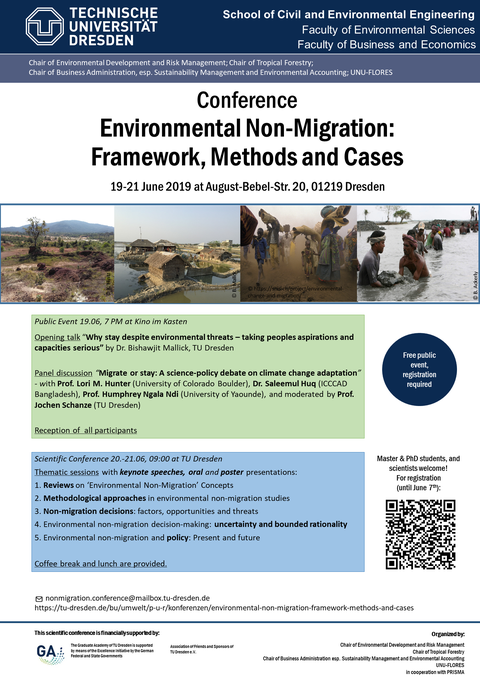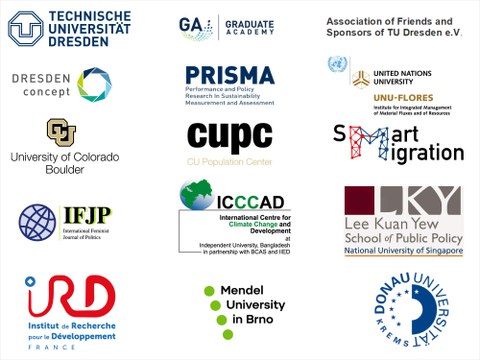Conference 'Environmental Non-Migration: Framework, Methods and Cases'
The first ever international conference on 'Environmental Non-Migration: Framework, Methods and Cases' took place from 19 to 21 June 2019 at the Technische Universität Dresden, Germany.
Contact For any further information please consult the following e-mail address:
19 to 21 June 2019, Technische Universität Dresden, Germany
Migration is old as humanity itself but the knowledge on migration is still rapidly evolving. Migration decisions seem to be the outcome of cumulative factors that produce migratory or non-migratory aspirations and depend on the individual, social, and cultural capacities to cope with and adapt to shocks and stressful situations. Those threats may particularly result from environmental degradation, natural disasters, and climate change impacts. Based on the current migration literature, factors and capacities with a key role for environmental non-migration are not well understood as not everybody exposed to the same risk is migrating. While factors of environmental migration (push-pull), types of migration (seasonal or permanent, voluntary or forced) and societal consequences of migration are broadly accepted, specific reasons why people stay put are unknown. It is not straightforward to claim how far the factors of environmental migration are also relevant for environmental non-migration. Advancements in this field are expected not only to broaden the respective knowledge but also to uncover factors and capacities of environmental resilience in a broader sense that could inform risk management and adaptation planning.
The first ever international conference on Environmental Non-Migration provides a forum for exchange and discussion on influencing factors and capacities of individuals, households and communities to stay put despite environmental threats. The focus is on conceptual frameworks, methodologies, case studies, and cross-cutting issues. Key results will be used to derive priorities for future research considering originality and relevance. The event brings together renowned experts from relevant disciplines and different regions of the world as well as early career scientists in the PhD and postdoctoral phase of their career. Accordingly, the conference will also foster international networking taking advantage of the recently founded Global Network on Environmental Non-Migration.
The conference will be organised in a series of thematic sessions as follows:
- Reviews on Environmental Non-Migration Concepts
- Methodological Approaches in Environmental Non-Migration Studies
- Non-Migration Decisions: Factors, Opportunities and Threats
- Environmental Non-Migration Decision Making Between Uncertainty and Bounded Rationality
- Environmental Non-Migration and Policy: Present and Future
The call is open to all topics related to the conference sessions. The submitted abstracts need to comprise the following information:
- Title of the paper
- Author(s) with the indication of the presenting author
- Affiliation of (all) author(s)
- Up to five keywords
- Text up to 500 words (including references) on original work of the author(s) (figures and table will not be considered as part of the abstract)
- Proposed assigment to the conference sessions
- Application for oral or poster presentation
Abstract submission deadline is 12 April 2019. Please send the abstract to the following e-mail adress:
The invitation to submit an abstract does not constitute any offer to pay travel, accommodation or registration costs associated with the conference.
Selection Procedure
All abstracts will be reviewed by the international Scientific Committee. Based upon, final decisions on acceptance as oral presentation or poster and assignment to the sessions are made by the Organisation Committee.
It is possible to request for an abstract notification letter.
Top ranked submissions will be invited for submission to a special issue of the Springer Journal ‘Population and Environment’ (https://link.springer.com/journal/11111). Other submissions will be considered for an edited book on ‘Environmental Non-Migration’ that will be published by Elsevier.
Registration is mandatory for all participants and will be open from 1 April to 7 June 2019.
The registration fees are:
- PhD and master students: 100 €
- Postdoctoral researchers: 150 €
- Senior scientists: 250 €
There is no abstract submission fee.
The registration fee covers:
- Conference bag with programme, abstract book, accessories
- Entry to all conference sessions
- Entry to the poster area
- 4x coffee break during the conference
- 2x lunch during the conference
- High level science-policy event with welcome reception
- Conference dinner in the near restaurant organised by the Organising Committee
- Farewell snacks
The Organising Committee offers a few grants for early career scientists (PhD students up to 6 years and postdoctoral researchers up to 9 years after graduation). The grants will be awarded based on grant applications with a 1 page letter of motivation.
The grant covers:
- Free registration
- Travel grant of max. 300 Euro for European participants and max. 500 Euro for international participants
Prerequisite for receiving the grant is that awardees submit a full-paper of a book chapter between 4500 and 6000 words till the 15 June 2019. Please send your application to the following e-mail adress:
- Abstract submission portal open: 28 February 2019
- Abstract submission deadline: 12 April 2019
- Notification of abstract acceptance: 8 May 2019
- Notification of selection for Early Career Scientists’ Grants: 8 May 2019
- Submission of full papers by awarded Early Career Scientists: 15 June 2019
- Registration deadline: 07 June 2019
- Conference: 19-21 June 2019
- Submission of journal articles: 30 September 2019
- Submission of book chapters: 31 October 2019
- Publication of edited volume: 30 June 2020
- Publication of special issue: 31 December 2020
Ackerly, Brooke, Prof. (Vanderbilt University, USA)
Akter, Sonia, Prof. (Lee Kuan Yew School of Public Policy, National University of Singapore, Singapore)
Buchenrieder, Gertrud , Prof. (Universität der Bundeswehr München, Germany)
Caricco, Amanda ,Prof. (Colorado University Boulder, USA)
Collyer, Michael, Prof. (Sussex Centre for Migration Research, International Development, UK)
Czaika, Mathias, Prof. (Danube University Krems, Austria)
Etzold, Benjamin ,Dr. (Bonn International Center for Conservation, Germany)
Faist, Thomas, Prof. (University of Bielefeld, Germany)
Fanchette, Sylvie, Dr. (Institute of Research for Development – CESSMA, Université Paris Diderot, France)
Fondufe, Lydia, Dr. (Came Women and Girls Development Organisation-CAWOGIDO, London, UK)
Gilligan, Jonathan ,Prof. (Vanderbilt University, USA)
Hunter, Lori M., Prof. (University of Colorado Boulder, USA)
Islam, Md. Monirul, Prof. (University of Dhaka, Bangladesh)
Martin, Maximillan, Dr. (Institute of Global Studies, University of Sussex, UK)
Naser, Mostafa M., Dr. (Edith Cowan University, Australia)
Ngala, Ndi Humphrey, Prof. (University of Yaoundé I, Cameroon)
Rodriguez, Libertad Chavez, Dr. (Centre for Research and Advanced Studies in Social Anthropology in Monterrey, Mexico)
Ghosh, Tuhin, Prof. (Jadavpur University, India)
Samanta, Gopa, Prof. (The University of Burdwan, India)
Stojanov, Robert, Dr. (Jean Monnet Fellow at the Migration Policy Centre (MPC) and Robert Schuman Centre for Advanced Studies, Italy)
Prof. Dr. Jochen Schanze and Dr. Bishawjit Mallick, Chair of Environmental Development and Risk Management, Technische Universität Dresden
Prof. Dr. Jürgen Pretzsch, Dr. Jude Kimengsi, Dr. Maxi Domke, and Kendisha S. Hintz, Chair of Tropical Forestry, Technische Universität Dresden
Prof. Dr. Edeltraud Günther, Chair of Business Management, esp. Sustainability Management and Environmental Accounting, Technische Universität Dresden and United Nations University Institute for Integrated Management of Material Fluxes and of Resources (UNU-FLORES), Dresden
in cooperation with PRISMA - Centre for Sustainability Assessment and Policy
The conference ‘Environmental Non-Migration: Frameworks, Methods and Cases’ will be held at Technische Universität Dresden, Germany.
Conference Venue
Technische Universität Dresden
August-Bebel Straße 20,30
01069 Dresden
How to reach the venue?
Public Transport:
From Mail Rail Station (Hauptbahnhof) take the Bus 66 direction Nickern/Lockwitz, and get down at the Bus stop Weberplatz. And then follow the direction shown there.
From North Rail Station (Bahnhof Nord) take the tram 11 direction (Zschernitz), and get down at Strehlener platz, and then follow the direction shown there.
For details information, you can use the public transport portal of Dresden, www.dvb.de
Registration:
Online registration will close on 7th June 2019. For registration use the following link:
Please make a note of your registration ID. Participants will be required to show the confirmation e-mail at the conference desk.
Travel and accommodation
Participants are expected to organise their own travel and accommodation, the conference organizer will not reimburse these expenses. Information on accommodation in Dresden can be found at the following website:
https://www.dresden.de/en/tourism/book/accommodation.php
Historical places, sightseeing and travel information can be found at
https://www.dresden.de/en/tourism/attractions.php
Personal data protection
For all the issues related to personal data protection, please consult the following document: https://tu-dresden.de/impressum?set_language=en
Contact
For any further information about the content of the conference, please contact: Organising Committee, E-mail:


